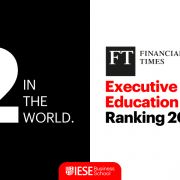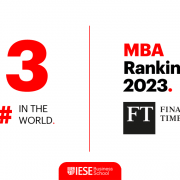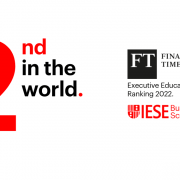IESE’s Executive Education Programs ranked no. 2 in the world by the Financial Times
- IESE’s Open Programs rank first in the world, with outstanding participant satisfaction a highlight
The Financial Times has ranked IESE’s Executive Education programs second in the world in the newly released FT Executive Education Combined Ranking 2023. The school’s Open Programs topped the global ranking in that category.
This latest result further cements IESE’s position as one of the premier schools for executive training worldwide. Since 2015, IESE’s Executive Education programs have ranked no. 1 or no. 2 worldwide in the FT ranking. This year, the FT highlighted IESE’s outstanding participant satisfaction rating, the relevance of its programs, its internationality, as well as the caliber of its faculty and participants.
“Ranking once again among the top two schools in the world for executive education shows our ability to consistently deliver an exceptional overall experience to the executives, entrepreneurs, and corporate clients who come to us for their training needs,” said Philip Moscoso, Associate Dean for Executive Education at IESE. “It’s particularly pleasing to note their high satisfaction levels with their time at IESE.”
The 2023 FT Executive Education ranking analyzes two types of programs for executives: open-enrollment programs (open to entrepreneurs and executives from any company) and custom programs (courses that are tailor-made for specific companies). The FT produces separate rankings for open and custom programs, and then an overall rating for all of executive education based on the data collected in them.
No. 1 in the world for Open Programs
In the Open Programs ranking, IESE again saw an exceptional participant satisfaction ranking (9.92 out of 10, the highest of any school on the list). Other areas of note were the follow-up provided to participants once they returned to the workplace (no. 2 in the world), course design and preparation (no. 2 for both), the relevance to the workplace of the skills participants gained in the program, the extent to which IESE programs encouraged new ways of thinking (no. 2 in the world for News Skills & Learning) and IESE´s internationality (no. 1 for both international locations and for partner schools, among other strengths).
IESE is also ranked the no. 4 business school in the world for Custom Programs. Despite Covid-19 being highly disruptive for international programs like IESE´s, corporate clients have continued to place their trust in IESE for their executive training needs. The FT ranking particularly highlighted: the internationality of IESE´s offerings (no.1 for international clients, no.2 for overseas programs, and an internationally diverse faculty), the ability of IESE programs to meet clients´ needs (no.6 in the world for aims achieved) while imparting new skills and learnings (no.7 in the world.), the high likelihood that clients will return to IESE for training as a demonstration of their satisfaction with the IESE experience (no. 7 for Future use) and IESE´s strong alliances with partner schools, including Harvard and MIT.
Find out more about IESE’s latest rankings here.
You can also see the full FT Executive Education rankings here.










